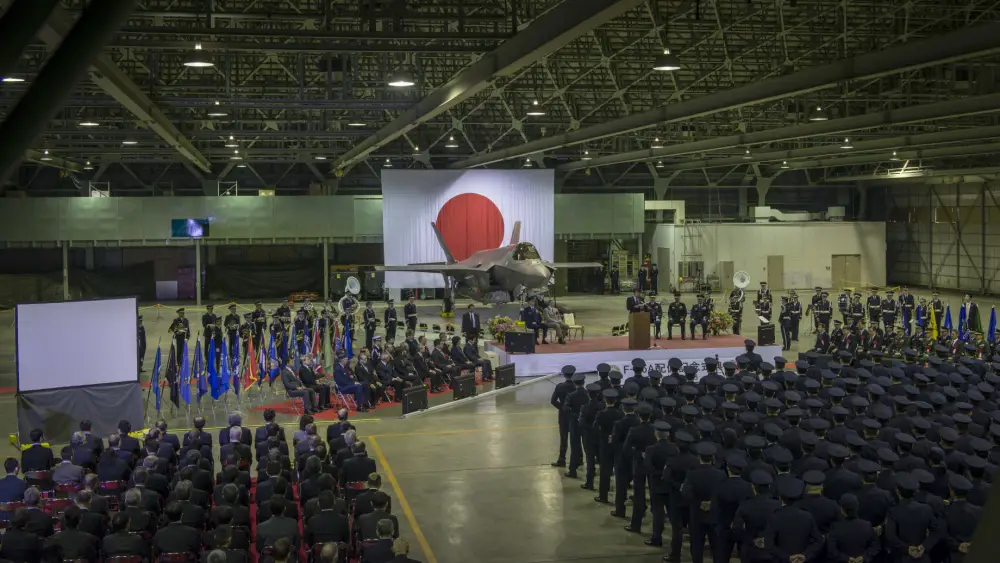The U.S. State Department has made a determination approving a possible Foreign Military Sale to the Government of Japan of one hundred five (105) F-35 Joint Strike Fighter aircraft and related equipment for an estimated cost of $23.11 billion. This proposed sale will support the foreign policy goals and national security objectives of the United States by improving the security of a major ally that is a force for political stability and economic progress in the Asia-Pacific region. It is vital to U.S. national interest to assist Japan in developing and maintaining a strong and effective self-defense capability. The prime contractors will be Lockheed Martin Aeronautics Company, Fort Worth, Texas; and Pratt and Whitney Military Engines, East Hartford, Connecticut.
The Government of Japan has requested to buy
— sixty-three (63) F-35A Conventional TakeÂOff and Landing (CTOL) aircraft,
— forty-two (42) F-35B Short Take-Off and Vertical Landing (STOVL) aircraft, and
— one hundred ten (110) Pratt and Whitney F135 engines (includes 5 spares).

Also included are Electronic Warfare Systems; Command, Control, Communications, Computers and Intelligence/Communications, Navigation and Identification; Autonomic Logistics Global Support System, Autonomic Logistics Information System; Flight Mission Trainer; Weapons Employment Capability, and other Subsystems, Features, and Capabilities; F-35 unique infrared flares; reprogramming center access and F-35 Performance Based Logistics; software development/integration; flight test instrumentation; aircraft ferry and tanker support; spare and repair parts; support equipment, tools and test equipment; technical data and publications; personnel training and training equipment; U.S. Government and contractor engineering, technical, and logistics support services; and other related elements of logistics support. The estimated total cost is $23.11 billion.
The proposed sale of aircraft and support will augment Japan’s operational aircraft inventory and enhance its air-to-air and air-to-ground self-defense capability. The Japan Air Self-Defense Force’s F-4 aircraft are being decommissioned as F-35s are added to the inventory. Japan will have no difficulty absorbing these aircraft into its armed forces. Implementation of this proposed sale will require multiple trips to Japan involving U.S. Government and contractor representatives for technical reviews/support, programs management, and training over a period of 25 years. U.S. contractor representatives will be required in Japan to conduct Contractor Engineering Technical Services (CETS) and Autonomic Logistics and Global Support (ALGS) for after-aircraft delivery.

Japan announced on 20 December 2011 its intent to purchase 42 F-35s to replace the F-4 Phantom II, with 38 to be assembled domestically and deliveries beginning in 2016. Japan has chosen the US-made F-35 stealth fighter jet to replace its aging F-4s as the mainstay of its air defence fleet. The jet was chosen over the Eurofighter Typhoon and Boeing F/A-18 Super Hornet. The decision had been widely expected, given the close ties between Tokyo and Washington. The US is Japan’s main security ally and the two countries regularly conduct joint military drills in the region. The Japanese government also decided in December 2018 to make the purchase to replace its outdated F-15 fighter jets and eventually increase its F-35 fleet to 147, in line with the country’s Medium Term Defense Program through fiscal 2023.
The Lockheed Martin F-35 Lightning II is an American family of single-seat, single-engine, all-weather stealth multirole combat aircraft that is intended to perform both air superiority and strike missions. It is also able to provide electronic warfare and intelligence, surveillance, and reconnaissance capabilities. Lockheed Martin is the prime F-35 contractor, with principal partners Northrop Grumman and BAE Systems. The aircraft has three main variants: the conventional takeoff and landing F-35A (CTOL), the short take-off and vertical-landing F-35B (STOVL), and the carrier-based F-35C (CV/CATOBAR). The F-35B entered service with the U.S. Marine Corps in July 2015, followed by the U.S. Air Force F-35A in August 2016 and the U.S. Navy F-35C in February 2019. The F-35 was first used in combat in 2018 by the Israeli Air Force.
















